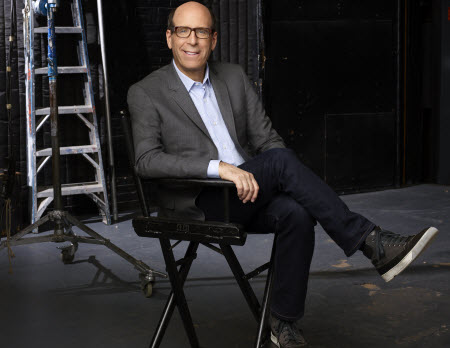Chairman Likes Showtime’s Standing Amid TV’s Chaos
The smarter way to stay on top of the multichannel video marketplace. Sign up below.
You are now subscribed
Your newsletter sign-up was successful

Related: Rocking Steady at Showtime | ‘Roadies’ Strikes a Romantic Chord: A Q&A With EP Winnie Holzman
Few executives in the television industry have the experience in the business — or a wit as dry — as Showtime Networks chairman Matt Blank.
Nearly a year after he tapped David Nevins to succeed him as CEO, Blank is settling into the role of chairman just fine. “I barely come to the office anymore,” he said with a straight face on a recent visit, to the guffaws of his public relations chief and two reporters. “My friends ask, ‘How do you know it’s Saturday?’”
At Showtime now for nearly three decades (since 1988) — and at HBO for 12 years before that — Blank is a fixture not only at the company he’s built, but in the industry where he grew up. With a producer’s gut instincts and a comedian’s timing, the affable Blank has earned distinction as a bona fide cable- TV pioneer with a long list of accolades. He remains active on a bevy of boards, from the National Cable & Telecommunications Association to the Manhattan Theatre Club.
When Showtime entertainment president Robert Greenblatt left in 2010 to join NBC, “not only was I looking for a good content person, I was looking for someone who might be a successor,” Blank said. “I looked at David’s shows [Arrested Development and Friday Night Lights among them] and thought, ‘These shows could have been Showtime shows.’” Nevins quickly impressed Blank by shepherding a string of hits, including Homeland, Ray Donovan, Masters of Sex, Penny Dreadful and The Affair.
Nevins had “the experience, the business acumen and the desire … and, over the years, it became clear to me he’s the guy,” Blank said. “He’s been on a fast track.” The two men have become inseparably close, speaking at least twice a day on matters large and small. Says Blank, “He’s family.”
Blank has a theory on the current chaos brought on by new over-the-top players, generational viewing trends and cord-cutting. Over the past several decades, “there was a disequilibrium in the industry,” Blank said, with the “haves” being powerful content giants and distributors, and the “have-nots” being smaller independent producers, networks and programmers. The cable industry was, in effect, a closed system.
The smarter way to stay on top of the multichannel video marketplace. Sign up below.
“Now, we’re moving into a period of much greater equilibrium,” Blank said. “And David’s content will have a chance to very much stand on its own.”
Blank is still deeply involved with programming decisions and, looking back, he’s most proud of Showtime’s brand and its cast of original deeply flawed but likeable characters — and how they resonate with good long runs. (Dexter and Weeds each ran eight seasons, and Homeland will run at least eight; Nurse Jackie ran seven and Shameless has been renewed for a seventh go-round). The network is now branching out with comedy (I’m Dying Up Here) and with music. Blank is like a proud papa describing Roadies: “It’s a different show for us. It’s not smack you in the face like Ray Donovan. But there is a soul to it.”
He seems hardly concerned at the mention of Netflix, Amazon and other OTT players spending heavily to find the next hit. Showtime is better prepared against all competitors because its monthly subscription business, he said, “travels very well” even direct to consumer.
“OK, so now we’ve got 100 OTT players? Well I grew up in a world where it was just HBO. Then HBO and Turner. Then Showtime,” he said. “It may be easier to have a [platform] now, but it doesn’t make it any easier to be a success.”
